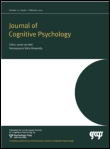
Journal of Cognitive Psychology
Scope & Guideline
Exploring the intricacies of human thought.
Introduction
Aims and Scopes
- Cognitive Processes and Mechanisms:
The journal emphasizes empirical studies that investigate cognitive processes such as attention, memory, reasoning, and decision-making, often utilizing experimental methodologies to understand how these processes operate. - Individual Differences in Cognition:
It explores how individual differences, including personality traits, cognitive styles, and neurological conditions, affect cognitive functioning and behavior, contributing to personalized approaches in cognitive psychology. - Emotional and Social Cognition:
The journal addresses the intersection between cognition and emotion, examining how emotional states influence cognitive processes and how social contexts shape cognitive behaviors. - Developmental and Educational Psychology:
Research on cognitive development across the lifespan, including studies on children’s learning processes and educational interventions, is a core area, emphasizing the application of cognitive psychology in educational settings. - Neuroscientific Approaches to Cognition:
The journal incorporates studies that utilize neuroscientific techniques, such as neuroimaging and electrophysiological methods, to investigate the neural underpinnings of cognitive processes. - Methodological Innovations:
It frequently publishes articles that introduce and validate new methodologies for studying cognition, such as eye-tracking and computational modeling, which enhance the understanding of cognitive mechanisms.
Trending and Emerging
- Impact of Technology on Cognition:
Research exploring how technology, such as smartphones and online learning platforms, affects cognitive processes and memory has gained prominence, reflecting societal changes in how cognition is studied in the digital age. - Mindfulness and Cognitive Control:
There is an increasing focus on the role of mindfulness practices in enhancing cognitive control and emotional regulation, highlighting the intersection of cognitive psychology with mental health and well-being. - Interdisciplinary Research Approaches:
Emerging studies that integrate cognitive psychology with other fields, such as neuroscience, education, and artificial intelligence, are on the rise, indicating a trend towards more holistic and collaborative research efforts. - Social and Emotional Influences on Cognition:
Research examining how social dynamics and emotional states impact cognitive processing and decision-making is trending, reflecting a growing recognition of the interplay between cognition and emotion. - Diversity in Cognitive Research:
There is a noticeable increase in research focusing on cognitive processes across diverse populations, including studies on bilingualism, cultural influences, and neurodiversity, broadening the scope of cognitive psychology.
Declining or Waning
- Traditional Cognitive Theories:
There has been a noticeable reduction in the publication of studies relying solely on traditional cognitive theories without integrating contemporary findings from neuroscience or social psychology, indicating a shift towards more interdisciplinary approaches. - Overly Generalized Findings:
Research that makes broad, generalized claims about cognitive processes without adequate empirical support has become less common, as the journal increasingly values specificity and contextual relevance in cognitive findings. - Focus on Purely Theoretical Papers:
The journal appears to be moving away from purely theoretical discussions that do not incorporate empirical data, favoring studies that provide concrete evidence through experimental or observational methods. - Cognitive Deficits Without Contextual Application:
Studies focusing on cognitive deficits in isolation, without exploring their implications for real-world applications or interventions, have decreased, reflecting a trend towards research with practical relevance.
Similar Journals
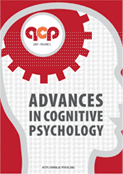
Advances in Cognitive Psychology
Fostering Global Insights in Cognitive PsychologyAdvances in Cognitive Psychology is a premier peer-reviewed journal published by UNIV ECONOMICS & HUMAN SCIENCES WARSAW, dedicated to the exploration of psychological processes underlying cognition. With its open access model implemented since 2005, the journal facilitates wide-ranging dissemination of cutting-edge research across various branches of psychology, including applied, clinical, experimental, and cognitive psychology. Despite its modest standing in terms of impact factor, reflected in its Q3 and Q4 rankings across numerous subfields, it remains an important platform for emerging researchers and seasoned professionals alike, aiming to foster insight into complex mental processes and enhance understanding of behavioral patterns. The journal's commitment to accessibility empowers a diverse community of readers, including students, to engage with innovative studies and reviews, contributing to the collective knowledge within the psychological sciences. Located in Poland, Advances in Cognitive Psychology is open for submissions from worldwide researchers, encouraging a global perspective on cognition and behavior.

Cognitive Neuroscience
Bridging Neuroscience and Cognitive TheoryCognitive Neuroscience is a pivotal journal in the ever-evolving field of cognitive neuroscience, published by Routledge Journals, Taylor & Francis Ltd, in the United Kingdom. Since its inception in 2010, this journal has dedicated itself to publishing innovative research that explores the intricate relationships between neural mechanisms and cognitive processes. With an increasing focus on interdisciplinary studies, it addresses critical issues from both theoretical and empirical perspectives. Although it currently holds a Q3 ranking in the Cognitive Neuroscience category, it has made significant strides in its Scopus ranking, now positioned at #62 out of 115, reflecting its growing impact on the academic community. Researchers and professionals will find the journal an invaluable resource for staying updated on the latest findings and methodologies in the field. While the journal operates under a traditional access model, it ensures high visibility and dissemination of crucial research that shapes our understanding of the brain's role in cognition. As it continues to evolve through to 2024, Cognitive Neuroscience remains committed to fostering collaboration and inspiring future innovations within the discipline.
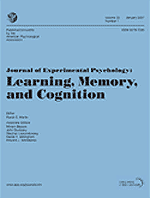
JOURNAL OF EXPERIMENTAL PSYCHOLOGY-LEARNING MEMORY AND COGNITION
Bridging theory and practice in experimental psychology.JOURNAL OF EXPERIMENTAL PSYCHOLOGY-LEARNING MEMORY AND COGNITION is a premier publication of the American Psychological Association, focused on the intricate mechanisms of learning, memory, and cognition. Established in 1975, this esteemed journal has consistently delivered impactful research, evidenced by its Q1 ranking in both Experimental and Cognitive Psychology and Linguistics and Language categories for 2023. With an impressive impact factor and ranked in the top percentiles of multiple fields, it serves as a crucial resource for researchers, professionals, and students who aspire to deepen their understanding of cognitive processes. The journal’s rigorous peer-review process ensures that only the most innovative and high-quality studies are published, providing a platform for groundbreaking findings that advance the field. Though not open access, the insights within each issue are invaluable for anyone interested in the dynamics of human cognition and memory.
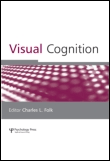
VISUAL COGNITION
Unraveling the Mysteries of Visual CognitionVISUAL COGNITION, published by Routledge Journals, Taylor & Francis Ltd, is a leading academic journal dedicated to the nuanced understanding of visual processing and cognition. Since its inception in 1994, the journal has become a pivotal resource for researchers and practitioners in fields including Cognitive Neuroscience and Psychology, having achieved a distinguished Q1 ranking in Arts and Humanities and impressive standings among its peers in experimental and cognitive psychology. With an impact factor reflecting its scholarly significance, VISUAL COGNITION serves as a forum for high-quality research articles that shed light on the cognitive aspects of visual perception. Although it operates under a subscription model, the journal remains committed to disseminating knowledge that inspires both established and emerging scholars alike. For those interested in the latest advancements in visual cognition, this journal promises a wealth of insights and rigorous scholarly dialogue.
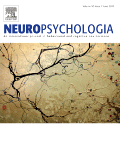
Neuropsychologia
Unlocking the Secrets of the Mind through Innovative StudiesNeuropsychologia, published by PERGAMON-ELSEVIER SCIENCE LTD, is a premier journal that delves into the intersections of psychology and neuroscience, specifically focusing on behavioral and cognitive processes. Since its inception in 1963, this esteemed journal has been a vital platform for researchers, professionals, and students, showcasing innovative studies and advancements in the fields of Behavioral Neuroscience, Cognitive Neuroscience, and Experimental Psychology. With a commendable impact factor, placing it in the Q2 category across multiple disciplines, Neuropsychologia is recognized for its contribution to the scientific community, ranking among the top journals in both Experimental and Cognitive Psychology and Neuroscience. The journal's commitment to excellence is evident in its rigorous peer-review process and its mission to disseminate cutting-edge research, making it an invaluable resource for those seeking to expand their knowledge and insights in neuropsychology. For further reading, the journal is accessible in both print and digital formats, ensuring that researchers can easily engage with the latest findings and theoretical advancements in this dynamic field.

JOURNAL OF COGNITIVE NEUROSCIENCE
Exploring the neural pathways of thought.Welcome to the JOURNAL OF COGNITIVE NEUROSCIENCE, a premier publication in the field of cognitive neuroscience, published by the esteemed MIT PRESS. Since its inception in 1989, this journal has been at the forefront of advancing our understanding of the neural mechanisms underlying cognitive processes, boasting an impressive convergence period through 2024. With its Q1 ranking in the 2023 cognitive neuroscience category, it stands out among 115 peers, indicating its critical role in shaping contemporary research. The journal offers a comprehensive array of research articles, reviews, and methodologies aimed at researchers, professionals, and students alike, facilitating the exploration of complex cognitive functions. While not an open-access journal, it provides essential insights and significant contributions to the neuroscience community, making it an invaluable resource for anyone keen on delving into the intricacies of the human brain.
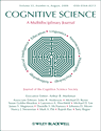
COGNITIVE SCIENCE
Illuminating the Complexities of CognitionCOGNITIVE SCIENCE, published by WILEY, is a leading academic journal that delves into the complexities of human cognition through an interdisciplinary lens. With an ISSN of 0364-0213 and an E-ISSN of 1551-6709, this journal has made significant strides in the field since its inception in 1977, ample coverage through to 2024, and a commendable Q1 and Q2 categorization in Experimental and Cognitive Psychology and Cognitive Neuroscience as of 2023. The journal is positioned at the intersection of various disciplines, ranking #65 out of 165 in Experimental and Cognitive Psychology and #58 out of 115 in Cognitive Neuroscience, highlighting its relevance and contribution to advancing knowledge in these areas. Although it does not offer open access, COGNITIVE SCIENCE remains an essential resource for researchers, professionals, and students seeking to explore groundbreaking research and theoretical insights within the vast domain of cognitive science.

Wiley Interdisciplinary Reviews-Cognitive Science
Fostering collaboration to illuminate cognitive complexities.Wiley Interdisciplinary Reviews-Cognitive Science (ISSN: 1939-5078, E-ISSN: 1939-5086), published by WILEY, stands as a premier academic journal dedicated to advancing the understanding of cognitive science through an interdisciplinary approach. Since its inception in 2010, the journal has rapidly established itself as a leading source of knowledge, achieving a Q1 ranking in the 2023 category of Medicine, Neuroscience, and Psychology, underscoring its significant impact within these fields. With a Scopus ranking of #27 in General Psychology and #30 in General Neuroscience, it offers researchers, professionals, and students access to cutting-edge research that bridges various disciplines, fostering collaboration and innovation. Though not openly accessible, this journal is critical for those aiming to stay at the forefront of cognitive science research, providing comprehensive reviews that synthesize emerging findings and highlight future directions for study.

Cognitive Processing
Transforming cognitive science through rigorous inquiry.Cognitive Processing, published by SPRINGER HEIDELBERG in Germany, is a leading journal dedicated to advancing the understanding of cognitive processes through interdisciplinary research. With its ISSN 1612-4782 and E-ISSN 1612-4790, the journal covers a diverse range of fields including Artificial Intelligence, Cognitive Neuroscience, and Experimental and Cognitive Psychology, making it an invaluable resource for researchers and professionals alike. While it currently does not operate under an Open Access model, it is well-regarded within the academic community, holding a respectable impact factor and ranking in the Q2 and Q3 quartiles as of 2023. The journal aims to foster innovation and collaboration among scholars, presenting high-quality original research, reviews, and theoretical discussions that bridge the gap between cognitive science and its practical implications. With a convergence of research from 2005 to 2024, Cognitive Processing continues to play a critical role in the evolving landscape of cognitive science literature.

COGNITIVE AFFECTIVE & BEHAVIORAL NEUROSCIENCE
Pioneering Discoveries: Navigating the Complexities of the Human BrainCOGNITIVE AFFECTIVE & BEHAVIORAL NEUROSCIENCE (ISSN: 1530-7026, E-ISSN: 1531-135X) is an esteemed journal published by SPRINGER that aims to advance the understanding of the interplay between cognitive processes, affective states, and behavioral responses in the field of neuroscience. Established in 2001, the journal provides a rigorous platform for disseminating high-quality research, with a significant focus on both Behavioral Neuroscience and Cognitive Neuroscience. Classified in Q1 and Q2 quartiles for 2023, it ranks highly within its categories, holding positions of #37 out of 88 and #46 out of 115 respectively in the Scopus listings. Although not an open-access publication, readers can access a wealth of valuable insights and innovative findings that enrich the scientific community's understanding of brain function and behavior. The journal's emphasis on interdisciplinary research contributes to its esteemed reputation, making it a vital resource for students, researchers, and professionals striving to explore the complex nature of the human mind and behavior.